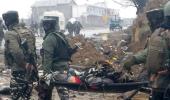'Each lab is working on a key advanced technology of importance to the development of futuristic defence.'
Ajai Shukla reports.

On Thursday, January 2, in Bengaluru, Prime Minister Narendra Damodardas Modi inaugurated five new scientific laboratories which will employ only scientists under the age of 35 to develop cutting-edge and futuristic technologies for military weaponry.
Three months after Modi won the 2014 election, he proposed that the Defence Research and Development Organisation empower its younger scientists by establishing at least five laboratories where everyone, including the director, was under the age of 35.
'We need labs in India which utilise raw talent, which employ people only below the age of 35. Let us allow these young scientists full decision-making power,' said Modi.
In response to his call, five so-called DRDO Young Scientist Laboratories have come up in Bengaluru, Mumbai, Chennai, Kolkata and Hyderabad.
'Each lab is working on a key advanced technology of importance to the development of futuristic defence,' said the DRDO on Thursday.
'Research in the area of rapidly evolving artificial intelligence will be carried out at Bengaluru. The all-important area of quantum technology will be based out of IIT-Bombay. The future is dependent on cognitive technologies and IIT-Madras will house the lab embarking in this area of research,' DRDO stated.
"New and futuristic area of asymmetric technologies, which will change the way wars are fought, will be based out of campus of Jadavpur University, Kolkata. The research in hot and critical area of smart materials and their applications will be based out of Hyderabad,' announced DRDO.
A committee, chaired by the principal scientific advisor to the government, K Vijay Raghavan, has selected the directors of these laboratories.
'Directors are empowered with financial and administrative authority at par with any director of a DRDO laboratory,' DRDO said.
While the five DYSLs would be reserved for youth, the DRDO's existing 52 laboratories are already utilising a large number of younger scientists in research on 21st century subjects like cyber security, electronic warfare and underwater systems.











 © 2025
© 2025